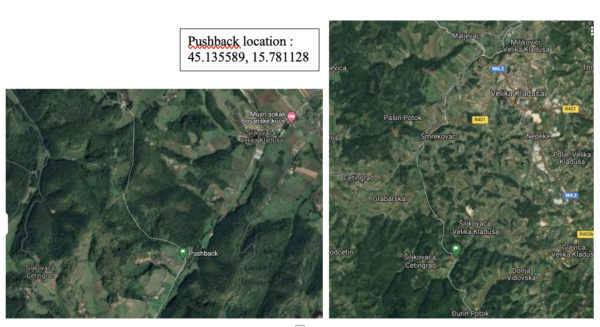The respondent is a 29-year-old woman from Cuba. She reported that she arrived in Bosnia two years ago with her partner and during the last six months they have unsuccessfully tried to cross the border eleven times.
She explained that she usually travels with her partner, but on January 17th, she decided to try her luck alone. She travelled with a young Iranian couple and found shelter in a house close to where they lived. Together, they left Hadžin Potok, a village situated near the Croatian-Bosnian border, at approximately 2 AM.
According to the respondent, they walked through the forest and eventually stopped at a crossroads in the south of Kruškovača, in Croatia, at about 7 AM. The approximate location is here.
The respondent described that she then called and sent texts to an unnamed NGO that provides legal information to people on the move, explaining that they were three people wishing to apply for asylum. The organisation reportedly told them they informed the police about their presence, and that they should stay where they are and remain visible.
A car that matched the description of a Croatian police car with two men in dark blue uniforms reportedly arrived at their location at approximately 11 AM. The respondent recalled that as soon as the officers approached the transit group, they asked for asylum repeating the words “we need asylum”. The officers then asked if they had papers, and, as the three of them answered that they didn’t, the officers simply asserted “no papers, so no asylum”. The respondent explained that her passport had been taken by the Croatian police and burnt in front of her eyes the first time she tried to enter Croatia to apply for asylum.
The respondent further explained that the officers then thoroughly searched the group, including the women. They then took their phones and told them to stay silent and wait. A moment later, two officers dressed in the same dark blue uniform reportedly arrived in a white van with the Croatian police insignia on it. The respondent stated that those newly arrived officers did not let them talk, took the phones from their colleagues, and urged them to get in the van.
They drove for what the respondent estimated to be one hour until they were taken out of the van at the border in the area of Šiljkovača. The officers returned their phones and reportedly told them to walk back to Bosnia. As the officers pushed back the transit group far from their departure point, the respondent reported that they had to walk for what felt like five to six in order to return to the place where they took shelter.

